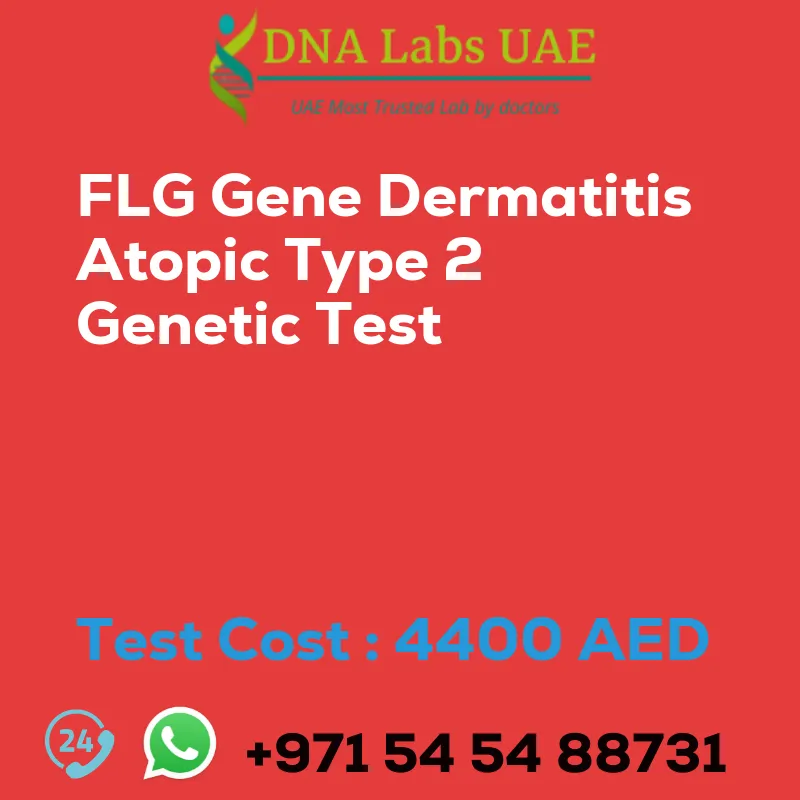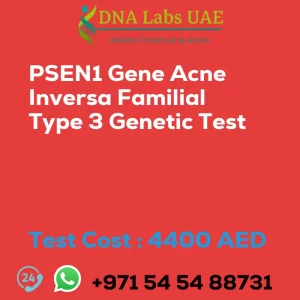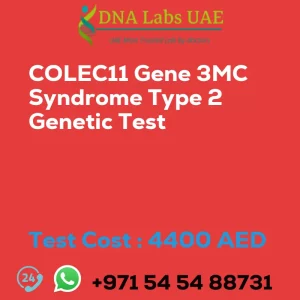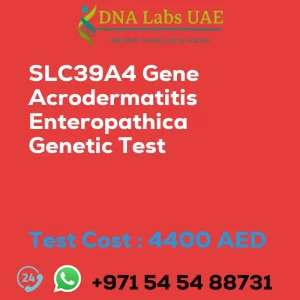FLG Gene Dermatitis atopic type 2 Genetic Test
At DNA Labs UAE, we offer the FLG Gene Dermatitis atopic type 2 Genetic Test at a cost of AED 4400.0. This test is designed to diagnose and manage atopic dermatitis, a common chronic inflammatory skin condition characterized by dry, itchy, and inflamed skin.
Test Components
- Price: 4400.0 AED
- Sample Condition: Blood or Extracted DNA or One drop Blood on FTA Card
- Report Delivery: 3 to 4 Weeks
- Method: NGS Technology
- Test Type: Osteology Dermatology Immunology Disorders
- Doctor: Dermatologist
- Test Department: Genetics
Pre Test Information
Prior to undergoing the FLG Gene Dermatitis atopic type 2 Genetic Test, it is important to provide the clinical history of the patient. Additionally, a genetic counseling session may be conducted to draw a pedigree chart of family members affected with FLG Gene Dermatitis, atopic type 2 NGS Genetic DNA Test gene FLG.
Test Details
The FLG gene dermatitis, also known as atopic dermatitis, is a common chronic inflammatory skin condition. It is characterized by dry, itchy, and inflamed skin. The FLG gene, also known as filaggrin gene, plays a crucial role in maintaining the integrity of the skin barrier. NGS genetic testing, also known as next-generation sequencing genetic testing, is a modern technique used to analyze multiple genes simultaneously. It helps in identifying specific genetic variants or mutations that may contribute to the development of atopic dermatitis.
NGS genetic testing for FLG gene dermatitis involves sequencing the FLG gene to identify any variations or mutations within the gene. This information can aid healthcare providers in diagnosing and managing atopic dermatitis more effectively. It also provides individuals with a better understanding of their genetic risk for developing the condition and may guide treatment decisions.
It is important to note that genetic testing alone is not sufficient to diagnose atopic dermatitis, as it is a complex condition influenced by various genetic and environmental factors. Therefore, the results of NGS genetic testing should be interpreted in conjunction with clinical symptoms and other diagnostic tests.
If you suspect you or your child may have atopic dermatitis, it is recommended to consult with a healthcare professional or a dermatologist. They can evaluate your symptoms, medical history, and perform appropriate diagnostic tests to provide an accurate diagnosis and develop an appropriate treatment plan.
| Test Name | FLG Gene Dermatitis atopic type 2 Genetic Test |
|---|---|
| Components | |
| Price | 4400.0 AED |
| Sample Condition | Blood or Extracted DNA or One drop Blood on FTA Card |
| Report Delivery | 3 to 4 Weeks |
| Method | NGS Technology |
| Test type | Osteology Dermatology Immunology Disorders |
| Doctor | Dermatologist |
| Test Department: | Genetics |
| Pre Test Information | Clinical History of Patient who is going for FLG Gene Dermatitis, atopic type 2 NGS Genetic DNA Test. A Genetic Counselling session to draw a pedigree chart of family members affected with FLG Gene Dermatitis, atopic type 2 NGS Genetic DNA Test gene FLG |
| Test Details |
FLG gene dermatitis, also known as atopic dermatitis, is a common chronic inflammatory skin condition characterized by dry, itchy, and inflamed skin. The FLG gene, also known as filaggrin gene, provides instructions for producing the protein filaggrin, which is crucial for maintaining the integrity of the skin barrier. NGS genetic testing, also known as next-generation sequencing genetic testing, is a modern technique used to analyze multiple genes simultaneously. It allows for the identification of specific genetic variants or mutations that may contribute to the development of atopic dermatitis. NGS genetic testing for FLG gene dermatitis involves sequencing the FLG gene to identify any variations or mutations within the gene. This information can help healthcare providers in diagnosing and managing atopic dermatitis more effectively. Additionally, it can provide individuals with a better understanding of their genetic risk for developing the condition and may guide treatment decisions. It is important to note that genetic testing alone is not sufficient to diagnose atopic dermatitis, as it is a complex condition influenced by various genetic and environmental factors. Therefore, the results of NGS genetic testing should be interpreted in conjunction with clinical symptoms and other diagnostic tests. If you suspect you or your child may have atopic dermatitis, it is recommended to consult with a healthcare professional or a dermatologist who can evaluate your symptoms, medical history, and perform appropriate diagnostic tests to provide an accurate diagnosis and develop an appropriate treatment plan. |








